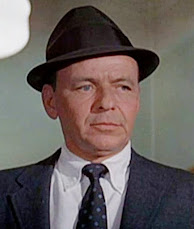The Detective (1968). Joe Leland (Frank Sinatra) is a no-nonsense NYC police detective who stands up defiantly to meddling politicians, cop corruption, and his superiors. His investigations into the brutal murder of a gay socialite and the mysterious suicide of an accountant take their toll on Joe--professionally and personally. His marriage is crumbling, in part because his wife Karen (Lee Remick) copes with her emotional insecurities by sleeping with other men. Used to bottling up his own emotions, the middle-aged Joe can't connect fully with Karen except on a physical level. Made in the turbulent late 1960s, The Detective is an ambitious, but shaky attempt to merge a Chandleresque crime drama with a character study. The former works better than the latter, with the flashbacks detailing Joe and Karen's relationship interspersed with Joe's investigations. It's a clunky structure that distracts the viewer from the best part of the movie. It also hampers Lee Remick's performance by relegating most of her scenes to poorly-written vignettes with Sinatra. The screenplay saddles some fine supporting actors with stereotyped characters: Ralph Meeker as a cop on the take, Robert Duvall as a bigoted detective, and Al Freeman, Jr. as a young Black officer who suddenly transforms from a naïve newcomer to a ruthless, overly ambitious detective. As a mystery, The Detective works well, though it's certainly not a surprise when Leland learns his two cases are connected. The NYC locations and Jack Klugman, in a small but pivotal part, are nice bonuses. Ultimately, The Detective doesn't compare favorably with Sinatra's best 1960s films (The Manchurian Candidate, Von Ryan's Express), but it is a worth a watch. You can view it for free on Hoopla if your local public library subscribes to that streaming service.
Monday, October 16, 2023
A Study in Terror and The Detective
A Study in Terror (1965). Murder By Decree (1979) may be the best known pairing of Sherlock Holmes and Jack the Ripper--but it wasn't the first. That distinction belongs to the mostly forgotten A Study in Terror. Produced with the cooperation of the Arthur Conan Doyle estate, A Study in Terror boasts an original screenplay that finds Holmes investigating a series of brutal murders in London's Whitehall area. His interest is peaked when he receives a case of surgical instruments that is missing the scalpel, the type of instrument that Scotland Yard believes was used in the murders. Holmes quickly discovers that the case belonged to Michael Osborne, the older son of Lord Carfax. Osborne vanished two years earlier, but could he have resurfaced as Jack the Ripper? Made on a modest budget, A Study in Terror recreates Victorian London convincingly and features a splendid performance by John Neville as the Baker Street detective. In fact, I'd rate Neville's portrayal as the fourth best, topped only by Jeremy Brett, Basil Rathbone, and Peter Cushing. Donald Huston makes an acceptable Dr. Watson, though he gushes over Holmes's deductions a bit too much. While the plot holds interest and moves swiftly, the fiery climax rushes to a conventional conclusion. Mostly disappointingly, the killer's motivation feels like an afterthought. Still, the primary reason to watch A Study in Terror is to see John Neville's Holmes. Fans of 1950s teen horror films might recognize one of the producers. Yes, that's the Herman Cohen, who made unforgettable drive-in classics such as I Was a Teenage Werewolf and I Was a Teenage Frankenstein.
Subscribe to:
Post Comments (Atom)










study in Terror ads were Batman style. "Original Caped Crusader!" POW!!!!
ReplyDeleteFun Facts:
ReplyDeleteThere was a tie-in paperback novelization of A Study In Terror, under the by-line Ellery Queen.
The screenplay was novelized by Paul W. Fairman (who'd had a long association with EQ, most recently as managing editor of EQ's Mystery Magazine), and then given a framing story involving Ellery Queen the detective, purportedly written by EQ's creators Fred Dannay and Manny Lee (this latter is subject to speculation, owing to Lee's problems at the time with writer's block; All sources that I have maintain that Dannay and Lee did in fact do the framing story themselves - a paycheck, but it counted).
Well, there it is, and here we are; if you've got the book or the DVD (and I've got both here somewhere), you can check it out at your pleasure ...
Doesn;t EQ correct Holmes in the book?
DeleteEnjoyed reading about these two films! Did you think that Al Freeman, Jr., did a good job in The Detective?
ReplyDeleteRecently saw this for the first time on TUBI,dripping with damp,foggy atmosphere and lurid,bloody goodness,became my favorite Sherlock Holmes film,even though I prefer Peter Cushing in 1959's 'Hound of the Baskervilles'.
ReplyDeleteHammer's The Hound of the Baskervilles is my favorite Holmes movie, too.
Delete